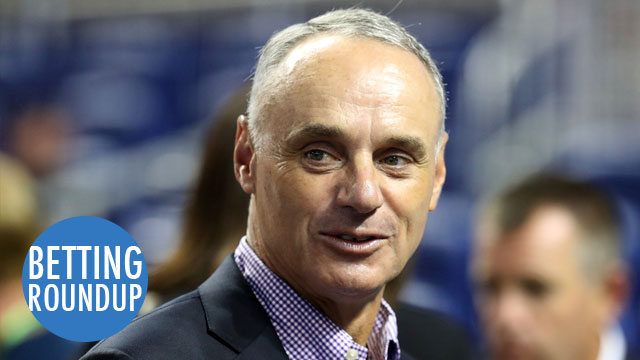Twice weekly, we’ll comb through as many articles, tweets and podcasts as we can find related to the world of sports betting and daily fantasy sports, and publish the good stuff here.
Stumble upon something you think we should include? Email info@bettingtalk.com.
* * *
MLB commissioner Rob Manfred said he wants his league to have a seat at the table when it comes to discussing the legal future of sports betting in the United States.
“If there’s going to be a change in the regulatory structure with respects to sports gambling, we needed to be in a position to meaningfully engage and shape, try to shape what the new regulatory scheme looks like,” commissioner Rob Manfred told the Baseball Writers Association of America on Tuesday. “We’re in the process of talking to our owners and figuring out where we want to be in the event that there is in fact a significant change coming.”
Manfred’s comments are the first to come from one of the plaintiff sports leagues since the Supreme Court announced in late June that it would review New Jersey’s appeal of a district court ruling that prevented the state from moving forward with plans to offer legal sports betting at its casinos and racetracks.
DraftKings and FanDuel announced they will abandon their merger plans.
“We believe it is in the best interests of our customers, employees, and investors to terminate our agreement to merge with FanDuel and move forward as a separate company,” DraftKings chief executive Jason Robins said in a statement. “This will allow us to singularly focus on our mission of providing the most innovative and engaging interactive sports experience imaginable.”
The decision comes as the two companies were facing a difficult legal battle against the Federal Trade Commission, which in June sued to stop the merger. The agency argued that the combined company would be a “near monopoly,” with more than 90 percent of the US market for paid daily fantasy sports.
DraftKings and FanDuel countered that anti-trust regulators had misunderstood their business. Both companies argued that they competed more broadly with fantasy sports games that last an entire season.
But the firms, once bitter rivals, also made clear in recent days they were assessing the likelihood of prevailing over the FTC.
By abandoning a deal the companies had contended was critical to their future, DraftKings and FanDuel now return to the familiar — and costly — role of battling each other for the upper hand in the still young daily fantasy sports business.
Conor McGregor predicted that he will knockout Floyd Mayweather “inside four rounds.” A Las Vegas sportsbook created a prop bet on his claim.
The Westgate Las Vegas SuperBook took those words to heart on Wednesday, opening odds on McGregor to win the fight in Rounds 1-4. The “yes” opened at +1000 (bet $100 to win $1,000), while the “no” was -2000 (bet $100 to win $5).
“Most people are thinking if McGregor wins, it needs to happen early,” Westgate SuperBook manager Jeff Sherman told ESPN. “We doubled the price of him winning straight up and made it reflective of the 25-1 each round prop in Rounds 1-4.”
An article published by NorthJersey.com says New Jersey’s case to legalize sports betting could have major stakes for the U.S. Constitution.
Although the stakes for New Jersey are huge, they’re even bigger for the Constitution. A loss for New Jersey would fundamentally change the relationship between the states and the federal government. One of the Constitution’s most venerable principles is federalism, which divides power between two levels of government – state and federal – to counteract each other and ensure that neither becomes so powerful that they threaten individual liberty.
To maintain that balance, the Supreme Court has held that the federal government cannot dictate that states implement particular policies; it cannot “commandeer” them, as the court put it. The Third Circuit’s decision upholding PASPA undermines that core constitutional protection by drawing a facile distinction between the federal government forcing a state to implement a policy in the first instance and forcing a state to maintain a policy that it has previously implemented, even if the state subsequently rejects the policy.
That unprecedented exception to the Supreme Court’s commandeering cases threatens to undermine a wide variety of laws. On many issues, the federal government and states work together through a practice known as cooperative federalism. This voluntary arrangement allows Congress to pursue its goals more efficiently and cheaper and, because states must be induced to participate, it gives them influence in how federal policies are set. But what state would participate if, once it initially agreed to a policy, Congress could pass a law binding it to the federal policy forever?
While the New Jersey case could bring legal sports betting to states across the country, online and mobile betting wouldn’t necessarily be quick to follow.
Here’s where we’re at in the United States in terms of online betting: Not very far.
A trio of states — New Jersey, Nevada and Delaware — have legal online poker or gambling. That’s it. (Pennsylvania appears poised to join them.) A handful of states have legal online lotteries.
Nevada — the only state where you can place single-game sports bets — also has mobile sports betting. And that has proven to be a success, as sports betting handle has increased substantially since its advent.
But in a world where states can change their laws to allow sports betting, there is not likely to be a corresponding groundswell of support for online sports gambling. To think states will instantly legalize sports betting and also allow it to happen online ignores the lack of support for online gambling around the country thus far.
